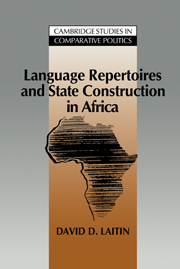Book contents
- Frontmatter
- Contents
- Preface
- PART I LANGUAGE REPERTOIRES AND THE STATE
- PART II SOCIOLOGICAL AND POLITICAL FORCES DESCRIBED
- 4 The micro dynamics of language use in contemporary Africa
- 5 Macro forces shaping the contemporary language situation in Africa
- PART III STRATEGIC THEORY APPLIED
- PART IV CONCLUSION AND POLICY RECOMMENDATIONS
- Notes
- References
- Index
4 - The micro dynamics of language use in contemporary Africa
Published online by Cambridge University Press: 03 May 2010
- Frontmatter
- Contents
- Preface
- PART I LANGUAGE REPERTOIRES AND THE STATE
- PART II SOCIOLOGICAL AND POLITICAL FORCES DESCRIBED
- 4 The micro dynamics of language use in contemporary Africa
- 5 Macro forces shaping the contemporary language situation in Africa
- PART III STRATEGIC THEORY APPLIED
- PART IV CONCLUSION AND POLICY RECOMMENDATIONS
- Notes
- References
- Index
Summary
Varenasi, the holy city on the Ganges River in India, houses the political movement seeking to institute Hindi as India's sole official language. Well-known Hindi-language novelists, literary figures, and poets have worked in Varenasi, and they have become icons in the symbolic war that has been fought against English. The focus of political activity has been on the expanded use of the Hindi language for government regulations, public education, and political administration, at the expense of English, which is perceived as a foreign language of colonial domination. Hindi, mentioned in the constitution as India's future link language, was slated to supplant English by 1965. Political protest in southern India and bureaucratic intransigence in New Delhi, India's capital city, have delayed – some say forever – the full implementation of the constitutional design for a single, indigenous link language. In Varenasi, political forces have organized to fulfill the constitutional dream.
A casual walk through central Varenasi tells a different story. On nearly every street there are signs advertising yet another private school which has English as its medium of instruction. One can surmise that the citizens of Varenasi vote for Hindi education, yet send their own children to English-medium schools. The sum of numerous family decisions to vote for Hindi yet personally to subvert the goals behind that vote is the continued reliance upon English as India's de facto link language.
Any country's language outcome is built upon, and ultimately cannot defy, the innumerable language choices that ordinary people make, consciously or unconsciously, every day.
- Type
- Chapter
- Information
- Language Repertoires and State Construction in Africa , pp. 69 - 81Publisher: Cambridge University PressPrint publication year: 1992

